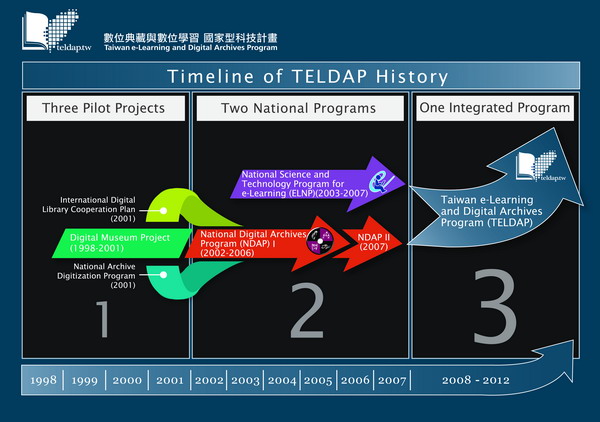History and Development
The first phase of the National Digital Archives Program(NDAP) and the National Science and Technology Program for e-Learning (ELNP) was designed to digitize national cultural treasures, including archaeology, archives, artifacts, calligraphy and paintings, flora and fauna, rare books, and other cultural assets, to cultivate popular e-learning culture, to encourage innovation in e-learning research, and to lay a cornerstone for Taiwan's e-learning and digital content industries. As the two programs progressed, it has become clear that the work of archives digitization was only a starting point towards establishing the digital content industry, and the establishment of digital archives was the first mile of the development of digital contents. The next major challenges are promoting and applying the products of NDAP and ELNP to culture, education, research and commerce systematically. In order to utilize the outcomes of the previous programs to the highest level for social and economic development, we need to leverage the support of the government and provide incentives to get the private sector engaged. Only when the private sector is engaged will these national science and technology programs be sustainable.
After six years of effort, each participating research institute or organization in NDAP has developed expertise and set its own priorities in the future development of digital archives. Similarly, participating government agencies and companies in the private sector in ELNP have also gained tremendous experience in utilizing e-learning to improve quality of services, education and professional training, provided to their stakeholders. By taking advantage of information technology and the expertise of researchers in the fields of culture, history, information, education, and management the NDAP and ELNP have not only promoted cultural heritage and given e-learning multifaceted meaning in information society, but also demonstrated the vitality of human civilization. As both programs are closely tied to information technology and require continuous management, TELDAP members will continue their research into the use of modern technology and core techniques for the preservation and representation of historical images, inscriptions and texts that are hundreds or thousands of years old. While we are moving towards the next stage of digital archives and e-learning, we will focus more on the promotion and application of the output products of the previous programs.
As the information technology and communication technology are developing vigorously, e-learning is now considered by most countries in the world to be one of the most promising solutions to the problems of teaching quality, learning environment, limited time and space, and the management of teaching resources. We will commit ourselves to finding and exploiting new e-learning technologies and the development of e-learning culture. Hopefully, in so doing we will reduce the digital divide between urban and rural areas, fairly distribute digital resources, create quality e-learning contents, strengthen the ability of teachers and students to use information technology, and promote a lively e-learning culture.
In summary, those who participated and were thus trained in previous projects constitute a professional team capable of doing innovative research and development of digital technologies. With this professional team, Taiwan can help other countries develop similar projects. TELDAP will then promote Taiwan's culture and share its experience with the world through international cooperation, multi-national projects and global communication and thereby strengthen Taiwan's competitiveness. TELDAP will also focus on the development of language learning, natural science and digital education. In order to expand Taiwan's share in the global Chinese language learning market, TELDAP will incorporate the resources of universities, the government and the private sector to produce first-rate Chinese language teachers and establish its own brand in the market, making itself a global center for Chinese culture digital archives and e-learning.

The Development of Taiwan e-Learning and Digital Archives Program